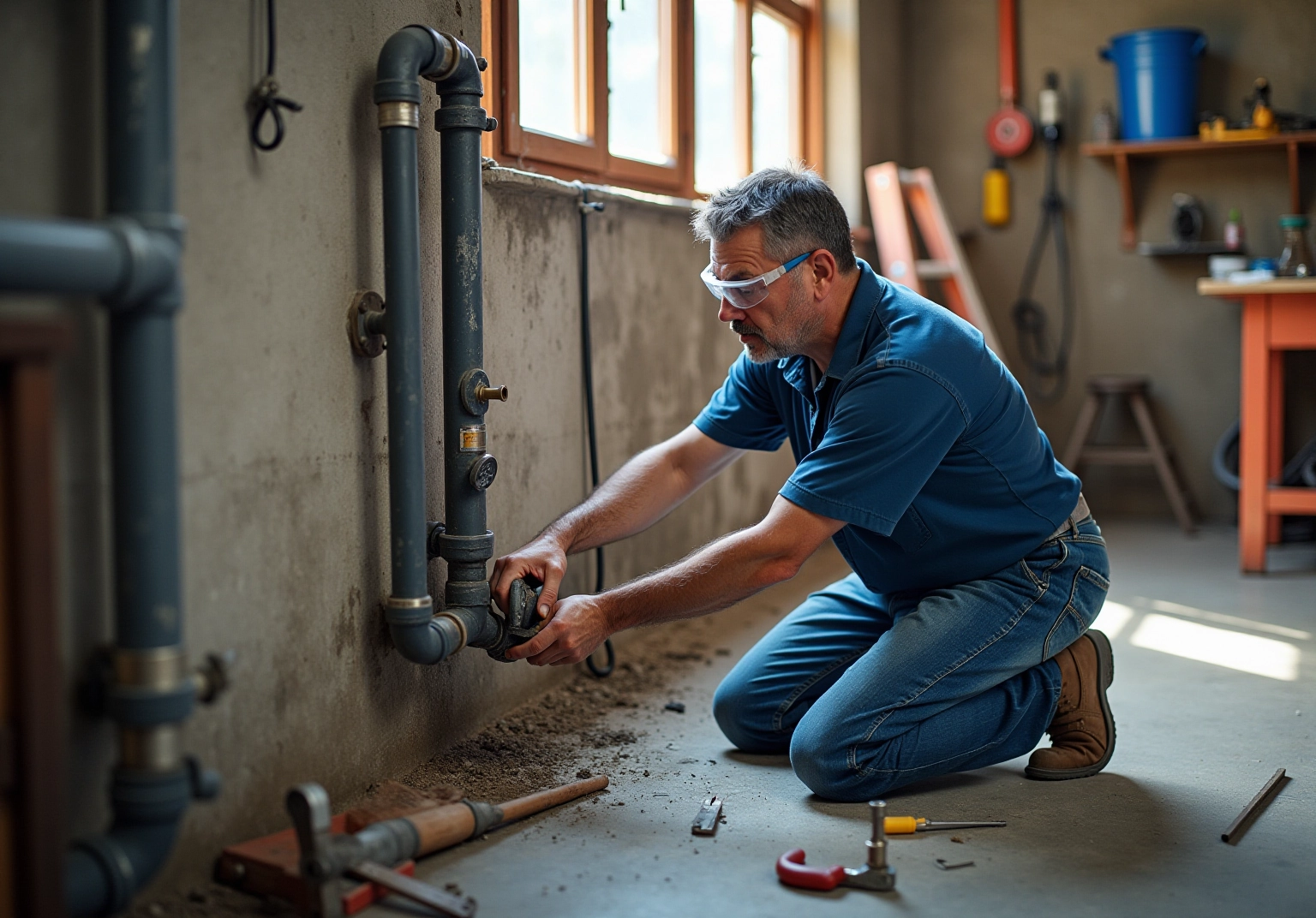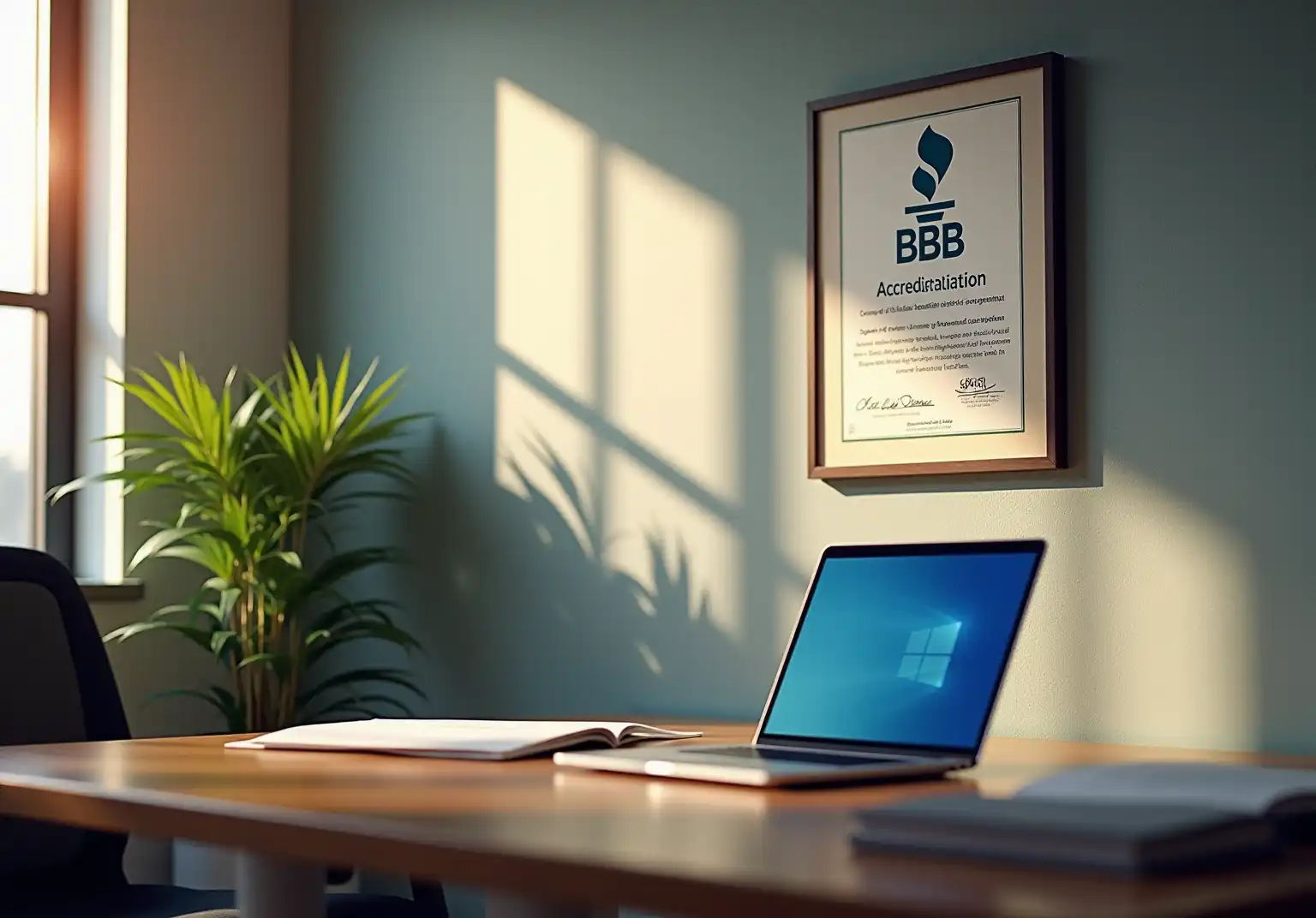Overview
If you’ve ever wondered how hard is it to become a plumber, picture the moment you adjust a stubborn thermostat while keeping water pressure steady – both jobs require patience, calloused hands, and a feel for flow.
So becoming a plumber can be a fulfilling journey, but it requires careful preparation and commitment. Aspiring professionals should follow essential steps, such as:
- Completing a high school diploma
- Enrolling in a trade school
- Participating in an apprenticeship
- Obtaining necessary certifications
These steps are not just formalities; they are crucial for gaining the knowledge and skills needed to thrive in this field. As the demand for skilled plumbers continues to grow, it becomes even more important to embrace these preparations wholeheartedly. By taking these steps, individuals can ensure they are well-equipped for a rewarding career, filled with opportunities to make a difference.
Introduction
The plumbing profession stands as a vital pillar of modern infrastructure, ensuring that water and gas flow seamlessly to our homes and businesses. For those contemplating a career in this essential field, it’s important to recognize that understanding the necessary steps and skills can pave the way to a rewarding and stable profession. Yet, with the plumbing sector poised for significant growth, aspiring plumbers encounter the challenge of not only meeting industry standards but also distinguishing themselves in a competitive job market. What essential steps must one take to evolve from a novice into a skilled plumbing professional?
Understand the Plumbing Profession and Its Requirements
The trade encompasses the installation, repair, and maintenance of systems that deliver water and gas to both residential and commercial buildings. For those aspiring to learn how to become a plumber, it is essential to possess a thorough understanding of water system codes, safety regulations, and the technical intricacies of these systems, often supported by plumbing software that streamlines planning and maintenance. It can be daunting to navigate this field, but recognizing the key requirements can provide a clearer path forward.
A High School Diploma or GED serves as a foundational education, emphasizing subjects like math, science, and technology. Approximately 92% of plumbers hold a high school diploma or equivalent, which is vital for grasping complex water system concepts. This educational background not only lays the groundwork for technical skills but also instills confidence in aspiring plumbers. Before you buy your first wrench, study your state board’s rules on how to become a licensed plumber; they list classroom hours, hands-on tests with digital sensors, and even airflow checks on vent stacks.
Physical Fitness is another crucial aspect of this profession. The job can be physically demanding, requiring strength and stamina to effectively manage various tasks. Understanding this requirement can help individuals prepare themselves for the physical challenges ahead.
Problem-Solving Skills are indispensable in plumbing, as technicians often face unexpected obstacles that demand quick thinking and innovative solutions. As Henry Sanches from Valor Plumbing insightfully shares, “When somebody sees automated texts when you’re on the way, it looks like you’re running a serious operation, even if you’re running out of your home.” This underscores the importance of effective communication and problem-solving in the field, reinforcing the need for aspiring technicians to cultivate these skills.
Additionally, Technical Skills are vital. Proficiency with the tools and technologies utilized in the trade is essential, especially as the sector evolves. Knowledge of intelligent water systems is becoming increasingly important, with an anticipated market value of $6.7 billion by 2027. Embracing these advancements can position technicians for success in a rapidly changing industry.
By grasping these requirements, you can better assess your readiness for a career in plumbing and understand how to become a plumber while identifying areas for personal growth. The plumbing sector is projected to expand by 6% from 2023 to 2033, with approximately 43,300 job opportunities for pipe fitters expected annually. This highlights the ongoing demand for skilled professionals, yet it’s important to acknowledge that only 33% of those in the plumbing trade remain in the profession for over two years. This statistic reflects a significant retention issue, emphasizing the need for education and support for newcomers.
By preparing adequately and understanding how to become a plumber, you can position yourself for a successful and fulfilling career in this vital and rewarding field.
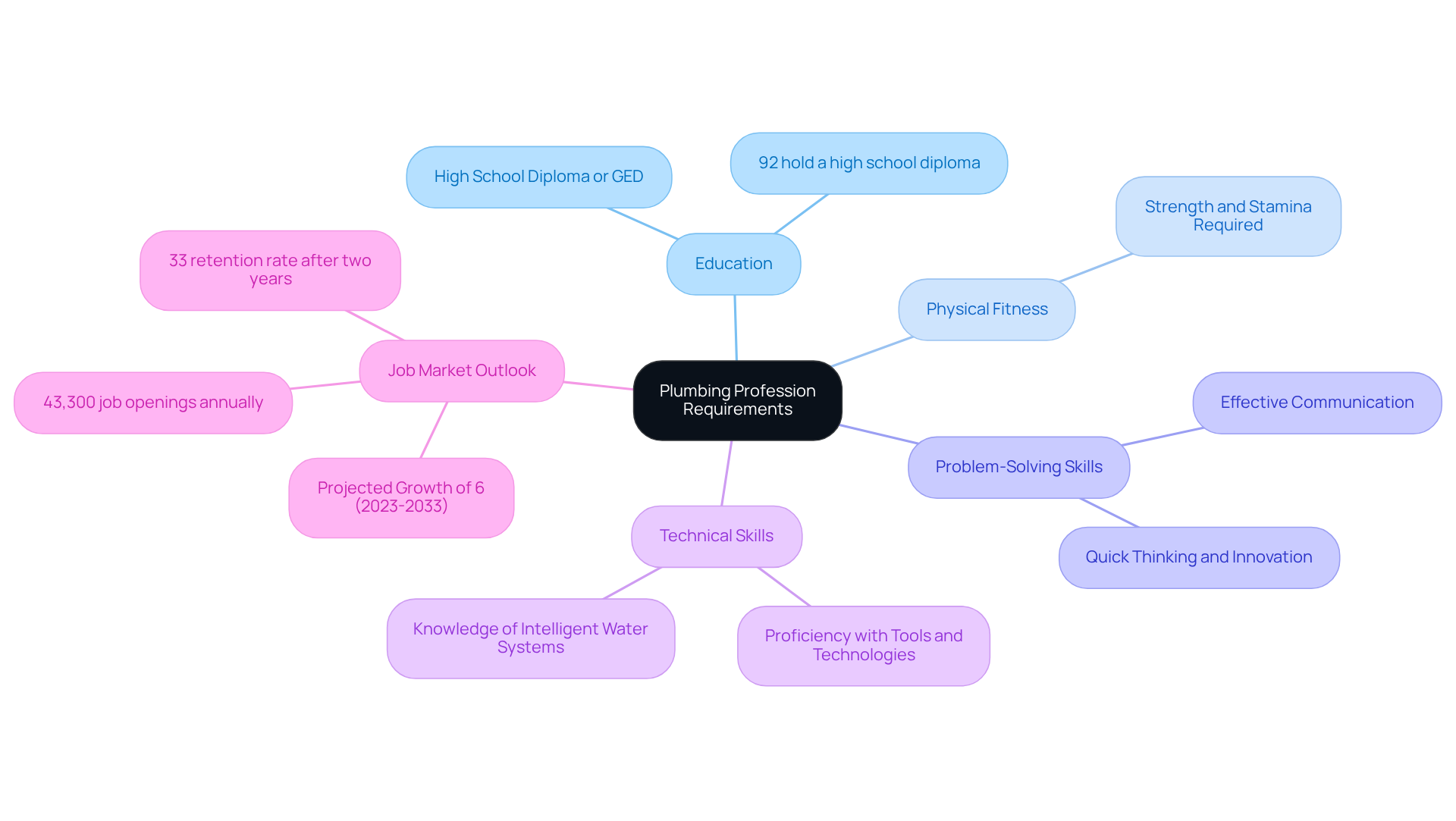
What Does a Plumber Do?
Plumbers are the quiet first-responders of any building project. One hour you’re clearing a kitchen drain; the next you’re threading steel that will carry steam across a brewery floor. Blueprint reading, fixture layout, leak detection, and code interpretation all happen before a single pipe is cut. You’ll juggle tape measures, inspection cameras, and, occasionally, a laptop that logs pressure curves while an exhaust fan ramps its airflow. Anyone mapping out how to become a licensed plumber soon learns the craft mixes problem-solving with hands-on grit.
Residential Plumbers
Home specialists install baths, dishwashers, hose bibs, and tankless heaters. They often crawl behind insulation, easing lines around joists the way HVAC techs angle a duct past a truss. A corroded elbow behaves like a stuck damper, starving a shower head of volume until the part is replaced. Communication skills matter; you’re in someone’s home, after all.
Commercial Plumbers
Restaurants, offices, and schools bring scale. Lunch hour can send pressure spiking, so these plumbers use balancing valves and remote sensors to keep flow even. They work shoulder-to-shoulder with electricians, fine-tuning service zones so the building’s daily rhythm never pauses.
Industrial Plumbers
Factories and labs raise the stakes: chemical lines, emergency showers, and strict ventilation codes. Welding schedule-80 steel near a reactor vessel demands steady nerves and the same mindful approach an engineer uses when trimming variable-speed pumps for peak efficiency.
Explore Educational Pathways and Apprenticeship Opportunities
Understanding how to become a plumber is a journey that requires careful planning and dedication. For aspiring professionals, following these essential educational pathways is vital to ensure a successful career in this rewarding field.
Complete High School or GED
This foundational step is crucial for qualifying for further training in the field. It lays the groundwork for future learning and skill development, which is essential for a thriving career. Instructors there break down how much does it cost to become a plumber – tuition, tools, test fees – so you can budget just as you would size variable volume systems, matching supply, return, and occupancy zones on a big commercial job.
Enroll in a Trade School
Many trade schools offer extensive programs in pipefitting that blend theoretical knowledge with practical experience. These courses typically cover water supply systems, installation methods, safety practices, and codes, which are essential for regulatory compliance. As we look to 2025, programs are expected to incorporate enhanced training on contemporary water supply technologies and practices, ensuring graduates are well-prepared for the industry.
Participate in an Apprenticeship
After completing trade school, individuals should seek apprenticeship opportunities, which generally last 4-5 years. These programs combine on-the-job training with classroom instruction, allowing apprentices to gain practical experience while earning a salary. Local pipe-fitting businesses and unions frequently support these accredited programs, offering a pathway to becoming a licensed tradesperson. A recent case study from Carroll’s Plumbing Apprenticeship Program illustrated how participants achieved Journeyman status in just four years while working full-time, showcasing the effectiveness of this route.
Obtain Necessary Certifications
Depending on state regulations, aspiring pipefitters may need to pass specific exams to secure their licenses. It is essential to research your state’s licensing requirements to ensure compliance and readiness for the exam. Trade school instructors emphasize that understanding these requirements early on can significantly impact an apprentice’s success.
By adhering to these steps, individuals will gain the essential skills and experience needed to understand how to become a plumber and thrive in the piping sector. The demand for skilled plumbers is projected to grow by 6% from 2023 to 2033, with approximately 43,300 job openings expected annually. This highlights the importance of pursuing these educational pathways and apprenticeship opportunities as essential steps in how to become a plumber, paving the way for a fulfilling career in plumbing.
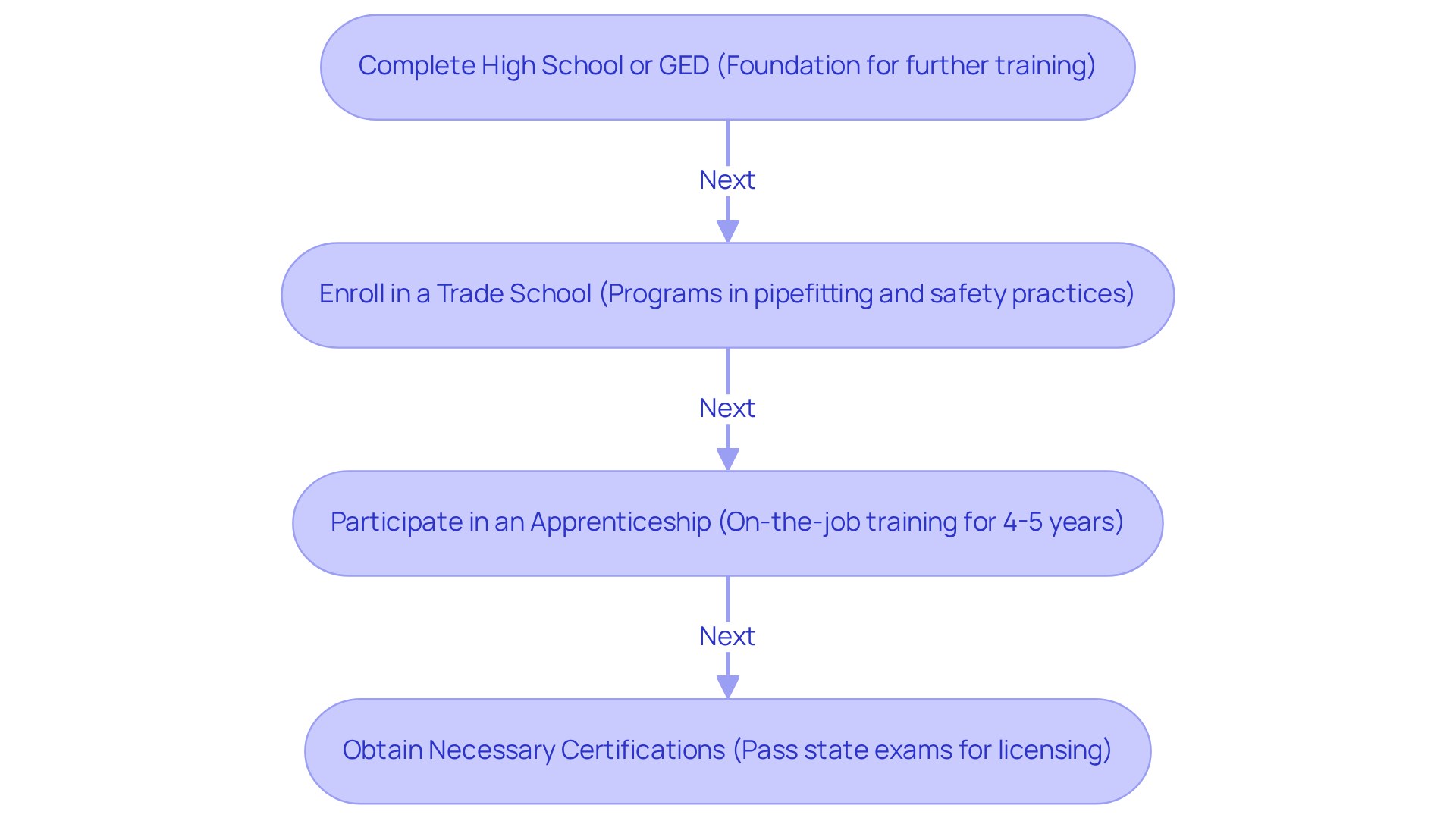
Licensing Requirements
State and municipal boards exist to protect public health, so the paperwork for anyone researching how to become a licensed plumber can feel daunting. Most jurisdictions demand 6,000-8,000 documented apprenticeship hours, proof of classroom theory, and a proctored exam that walks you through code tables, backflow assemblies, and combustion-air math. Fees vary, which explains why many students also look up how to become a certified plumber when comparing states. Expect fingerprinting, background checks, and liability insurance minimums. The written test doesn’t stop at water pipe sizing; you’ll field questions on mixing valves, controls that safeguard makeup water, and even duct clearances around gas vents. Some boards add a practical exam where gauges and digital supply/return probes verify your workmanship under live pressure. Once you pass, the license must be renewed every one to three years, usually with proof of continuing education on new materials, energy codes, and cross-connection rules. Keeping track of these deadlines is part of learning how to become a licensed plumber who never lapses.
Develop Job Search Strategies and Build Professional Networks
After completing your education and apprenticeship, you may find how to become plumber as part of the daunting job search. It’s crucial to approach this phase with a strategic mindset regarding how to become plumber. Here are several effective strategies to consider that can guide you through this challenging time:
- Utilize Job Boards: Consider leveraging platforms like Indeed, Monster, and specialized trade job boards to discover local job openings tailored to your skills. With the piping sector expected to expand by 2% from 2018 to 2028, utilizing these resources can assist you in uncovering opportunities in a competitive market, alleviating some of the stress associated with job hunting. Today’s contractors sort résumés by who already knows how to become a certified plumber and can pull live readings from VAV boxes, duct sensors, and ventilation dashboards.
- Network with Industry Professionals: Attend local plumbing trade shows, workshops, and networking events. Building relationships in these settings can lead to valuable job referrals and mentorship opportunities, which are essential in a competitive job market. As Nick Difort from C&D Experts states, “The software’s ease of use for scheduling and communication has made networking more accessible for professionals in our field.” This highlights how connection can ease the path to employment.
- Join Professional Associations: Engaging with organizations such as the Plumbing-Heating-Cooling Contractors Association (PHCC) can provide you with resources, networking opportunities, and access to job listings that can significantly aid your job search. Many successful plumbers attribute their career advancements to connections made through these associations, showcasing the supportive community available to you.
- Leverage Social Media: Utilize platforms like LinkedIn to connect with industry professionals, showcase your skills, and stay informed about job openings. A strong online presence can enhance your visibility to potential employers, especially as 63% of survey respondents trust online reviews as much as personal recommendations, reinforcing the importance of being present in the digital space.
- Cold Calling: Proactively reaching out to local pipefitting companies to inquire about job openings or apprenticeship opportunities can set you apart from other candidates. This direct approach not only demonstrates your initiative but also reflects your commitment to finding the right role. Many professionals in plumbing have achieved success through this method, highlighting the significance of being proactive in your job search.
Applying these strategies can greatly improve your likelihood of understanding how to become plumber and obtaining a fulfilling role in the trade. Networking is particularly effective, as many job openings are filled through referrals, underscoring the importance of building a robust professional network. With the average salary for a plumbing professional projected at $55,337 in 2025, investing your time in these strategies can lead to a fruitful and rewarding career.
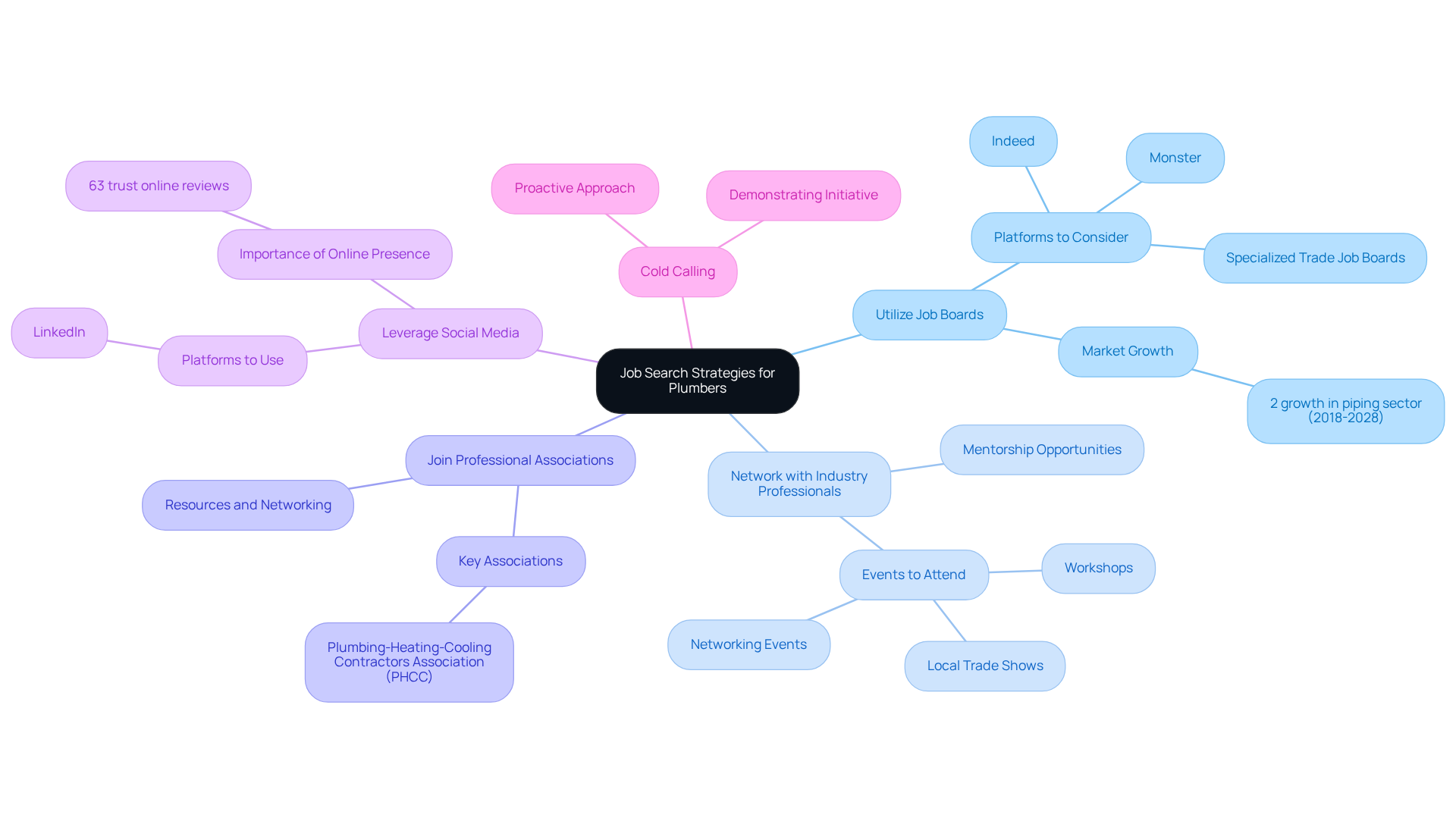
Commit to Continuous Learning and Skill Development
In the ever-evolving piping sector, the importance of continuous learning cannot be overstated. Professionals face the challenge of keeping up with rapid advancements, making it essential to embrace ongoing education. Here are some effective strategies to support your growth:
- Attend Workshops and Seminars: Engaging in industry-specific workshops allows you to gain valuable insights into new technologies, techniques, and regulatory changes. Many plumbers actively participate in these events, recognizing that such involvement significantly enriches their knowledge base.
- Pursue Advanced Certifications: Obtaining advanced certifications in specialized areas, such as backflow prevention, medical gas installation, or eco-friendly piping practices, can greatly enhance your credentials and marketability. Numerous professionals have shared how these certifications have opened doors to new opportunities and increased their earning potential.
- Stay Informed on Industry Trends: Subscribing to trade magazines, blogs, and online forums is crucial for staying updated on the latest news and developments. This practice not only keeps you informed about emerging technologies but also helps you understand shifts in consumer preferences and regulatory requirements.
- Join Continuing Education Courses: Many organizations offer continuing education courses that are essential for maintaining your license and expanding your skill set. Participating in these courses provides you with the most recent sector knowledge and practical skills needed in your profession.
- Network with Peers: Building connections with other trade professionals fosters a collaborative learning environment. Networking allows for the sharing of knowledge and experiences, leading to valuable insights into best practices and emerging trends.
From press-fit copper to smart dampers that sync with cloud controls, chasing every new credential is how to become a master plumber who squeezes extra efficiency from both water and air systems. As the plumbing workforce is projected to grow significantly, many professionals are learning how to become plumber through the vital role that ongoing education plays in remaining competitive.
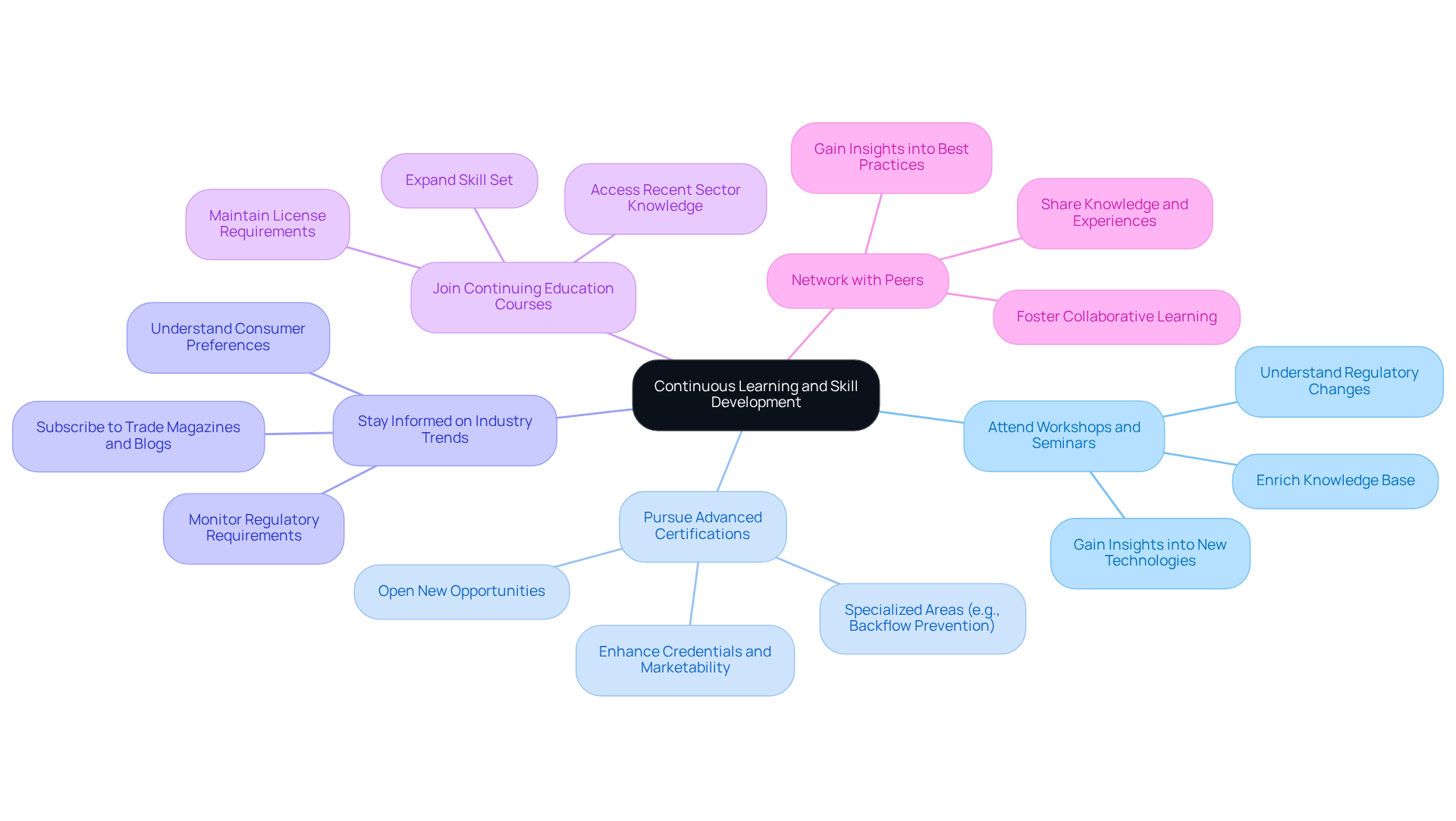
Career Opportunities as a Licensed Plumber
A fresh card in your wallet unlocks more than service calls. Residential companies hire techs who can explain water-heater rebates to homeowners, while mechanical contractors covet foremen able to coordinate the return manifolds on a 30-story tower. Municipalities recruit inspectors who know how to become master plumbers and can scan BIM models for code violations before the first trench is dug. Manufacturers value support reps versed in smart-valve firmware – skills honed while studying how to become a licensed plumber – to train facility managers on remote controls and inline sensors. There is also the union route, where traveling pipefitters service stadium chillers and balance enormous supply headers with laptop-driven volume calculators. Niche gigs keep expanding: rain-harvest consultants, medical-gas certifiers, and even grey-water designers who tune system zones with the same care HVAC pros give a VAV box. Salaries follow responsibility; many masters make up to $100k, and business owners double that when crews grow. The work is recession-resistant – leaks don’t wait for the economy – so anyone mapping out how to become a master plumber can expect steady calls, a solid pension if unionized, and daily puzzles that reward ingenuity.
Conclusion
Embarking on the journey to become a plumber is a multifaceted endeavor, filled with essential steps that form the foundation for a rewarding career. This profession not only demands technical knowledge and physical fitness but also highlights the importance of problem-solving skills and a commitment to lifelong learning. By understanding the various aspects of this trade, aspiring plumbers can equip themselves to face the challenges and embrace the opportunities that await them.
Throughout this article, we’ve explored key insights that underscore the value of foundational education, hands-on experience through apprenticeships, and the importance of obtaining relevant certifications. Moreover, we cannot overlook the vital role of networking and strategic job search methods; building relationships within the industry can open doors to invaluable job referrals and mentorship opportunities. Continuous learning remains essential in adapting to the ever-evolving plumbing landscape, ensuring that professionals remain competitive and well-informed.
As the plumbing sector continues to grow, the demand for skilled technicians is expected to increase, presenting a wonderful opportunity for those eager to enter the field. By embracing these critical steps and committing to ongoing education, individuals will not only enhance their own capabilities but also contribute to the overall success of the plumbing industry. For aspiring plumbers, this journey may present challenges, but with dedication and the right strategies, a fulfilling and rewarding career is within reach.
Frequently Asked Questions
What does the plumbing profession encompass?
The plumbing profession involves the installation, repair, and maintenance of systems that deliver water and gas to both residential and commercial buildings.
What foundational education is required to become a plumber?
A High School Diploma or GED is essential, with an emphasis on subjects like math, science, and technology, as it helps in understanding complex water system concepts.
Why is physical fitness important for plumbers?
The job can be physically demanding, requiring strength and stamina to manage various tasks effectively.
What skills are critical for success in plumbing?
Critical skills include problem-solving abilities, technical skills, and effective communication, as plumbers often face unexpected challenges that require quick thinking and innovation.
How is technology impacting the plumbing profession?
Proficiency with tools and technologies is essential, especially with the rise of intelligent water systems, which are projected to have a market value of $6.7 billion by 2027.
What is the job outlook for the plumbing profession?
The plumbing sector is projected to expand by 6% from 2023 to 2033, with approximately 43,300 job opportunities for pipe fitters expected annually.
What is a notable retention issue in the plumbing profession?
Only 33% of those in the plumbing trade remain in the profession for over two years, highlighting a significant retention issue that underscores the need for education and support for newcomers.
How can aspiring plumbers prepare for a career in plumbing?
By understanding the requirements, assessing their readiness, and identifying areas for personal growth, individuals can better position themselves for a successful career in plumbing.
List of Sources
- Understand the Plumbing Profession and Its Requirements
- Plumbing Industry Statistics and Trends to Know for 2025 (and Beyond) (https://getjobber.com/academy/plumbing/plumbing-industry-statistics)
- Skills Gap In Entry-level Plumbing: Big Data-Driven Analysis (https://softwareoasis.com/skills-gap-in-entry-level-plumbing)
- Plumber Ranks Among Best Jobs of 2025 (https://money.usnews.com/careers/best-jobs/plumber)
- 78 Plumbing Facts and Statistics You Need to Know in 2025 (https://workyard.com/field-service-management/plumbing-facts-and-industry-statistics)
- Plumbers, Pipefitters, and Steamfitters (https://bls.gov/ooh/construction-and-extraction/plumbers-pipefitters-and-steamfitters.htm)
- Explore Educational Pathways and Apprenticeship Opportunities
- Plumbing Apprenticeship Certificate (https://carrollcc.edu/programs/professional-skills-job-training/plumbing-apprenticeship-certificate)
- Plumbing Apprentice Job Description Template – AvaHR (https://avahr.com/plumbing-apprentice-job-description-template)
- Plumbers, Pipefitters, and Steamfitters (https://bls.gov/ooh/construction-and-extraction/plumbers-pipefitters-and-steamfitters.htm)
- How Long Does It Take to Become a Plumber? – FieldEdge (https://fieldedge.com/blog/how-long-does-it-take-to-become-a-plumber)
- How Long Is A Plumbing Apprenticeship? (https://becomeopedia.com/how-long-is-a-plumbing-apprenticeship)
- Develop Job Search Strategies and Build Professional Networks
- Plumber Trends (https://zippia.com/plumber-jobs/trends)
- 22 Plumbing Industry Statistics To Know [June 2025 Update] (https://scottmax.com/plumbing-industry-statistics)
- 78 Plumbing Facts and Statistics You Need to Know in 2025 (https://workyard.com/field-service-management/plumbing-facts-and-industry-statistics)
- Plumbing Industry Statistics and Trends to Know for 2025 (and Beyond) (https://getjobber.com/academy/plumbing/plumbing-industry-statistics)
- Plumbing Industry Market Growth in 2024 (And Beyond!) (https://rivaldigital.com/blog/plumbing-industry-market-growth)
- Commit to Continuous Learning and Skill Development
- Benefits of Becoming a Plumber – Consider a Future in Plumbing | Justice Plumbing (https://justiceplumbing.com/blog/2021/july/benefits-of-becoming-a-plumber)
- For the Life of the Union Plumber (https://contractormag.com/training/article/21247521/for-the-life-of-the-union-plumber)
- The Plumber Problem: How Businesses Can Train Their Way to Savings (https://workiz.com/blog/tips-tricks/plumber-shortage-and-how-to-train-an-employee)
- Plumbing industry statistics 2025 (https://consumeraffairs.com/homeowners/plumbing-industry-statistics.html)
- 21 Plumbing Industry Statistics | Hook Agency (https://hookagency.com/blog/plumbing-industry-statistics)
